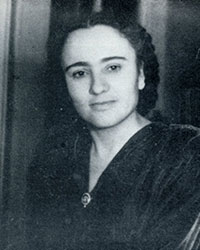SHARE WITH FRIENDS:
 The beloved poetess of the Uzbek people, well-known public figure Zulfiya Israilova was born on March 1915, 1 in Tashkent in a family of craftsmen. While studying at a women's school (1931-1934), the poetess began to practice poetry in literary circles. From 1935 to 1938 he studied at the graduate school of the Institute of Language and Literature of the Academy of Sciences of Uzbekistan. Then in 1938-1948 he was an editor at the Children's Publishing House, head of the department at the State Publishing House of Uzbekistan, and from 1950 to 1953 head of the department at the magazine "Women of Uzbekistan" ("Saodat"). From 1953 to 1980 he worked as the editor-in-chief.
The beloved poetess of the Uzbek people, well-known public figure Zulfiya Israilova was born on March 1915, 1 in Tashkent in a family of craftsmen. While studying at a women's school (1931-1934), the poetess began to practice poetry in literary circles. From 1935 to 1938 he studied at the graduate school of the Institute of Language and Literature of the Academy of Sciences of Uzbekistan. Then in 1938-1948 he was an editor at the Children's Publishing House, head of the department at the State Publishing House of Uzbekistan, and from 1950 to 1953 head of the department at the magazine "Women of Uzbekistan" ("Saodat"). From 1953 to 1980 he worked as the editor-in-chief.
Zulfiya joined the ranks of Aydin, Muzayyana Alaviya, Khosiyat Tillakhonova with the first collection of poems "Pages of Life" (17), written at the age of 1932.
The role of the traditions of Uzbek and Russian classical literature, folklore and world literature in Zulfiya's creative maturity has been enormous.
The poetess dedicates her poetic works such as "Poems" and "Song of Girls" (1938) to the hot lives of cotton-growers, mechanics, tractor girls working in the motherland and its fields and deserts. At the same time, the poems in these collections were also important as works characterizing the period when the poet mastered the secrets of poetic skill.
During the war, the publication of the poet's collections, such as "They called him Farhod" (1943), "In the days of Hijran" (1944), was a sign of Zulfiya's bold entry into the ranks of leading poets. The poems in the collection are characterized by love for the homeland, hatred of the enemy and confidence in victory. Zulfiya's promising poems, such as "My Homeland", "Overcoat with a gun in my hand", "Wait for us", are among the works that reflect the fighting spirit of wartime Uzbek poetry.
The poet wrote a number of poems in the post-war years, such as "A Day in the Field" (1948), "Song of Dawn" (1953), "I sing the morning", "People close to my heart" (1958), "My songs to you" (1965). The national anthem is sung with the lives of those who show selflessness in the process of work. Essays and epics such as "My Poet Interrogates the Poet" (1960), "Moon" (1953), "Sunny Pen" (1967). Dedicated to the bright memories of such masters as Hakimzoda, Oybek, Aydin, Hamid Olimjon.
Zulfiya H. He also composed pesa and opera librettos based on Olimjon's epics "Semurug", "Zaynab and Omon".
Zulfiya was the winner of the Hamza Republican State Prize for her poetry collections "Houses" and "Shalola". He was awarded the Jawaharlal Nehru International Prize for his Indian-themed poems, the International Lily Award for his works glorifying peace and friendship, and his active participation in the progressive Asian and African writers' movement.
The poetess has visited countries such as India, Yugoslavia, Sri Lanka, Egypt, Burma, Austria. He participated in the first conference of Asian and African writers in Delhi in 1956 and created the famous Mushoira (1958).
His poems have been translated into Russian, English, German, Hindi, Bulgarian, Chinese, Arabic, Persian and other languages. Shoira Nekrasov, Lermontov, V. Inber, Lesya Ukrainka, Edi Ognetsvet, M. Dilbozi skillfully translated Amrita Pritam's works into Uzbek.
The famous poet died on August 81, 1996, at the age of 1.